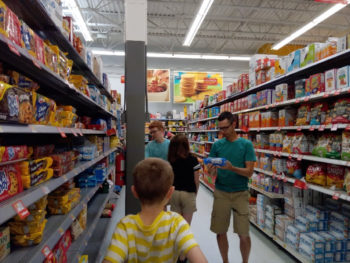After I had my first child and for many years after that, I did my best to stay on top of all of the news, every day. I felt a need to stay super-informed on everything that was going on in the world, I suppose out of an abundance of caution about what threats I should be concerned about for my children. I watched the local news and cable news, listened to talk radio, and read the newspaper and news website articles. I became very afraid of what kind of world I had brought my children into. Things seemed to be so horrible. Every day there was bad news everywhere. Then a change happened.
I started to compare my reality with what the news media was saying. Each interaction I had in my life, whether it was with family members, the cashier at the grocery store, or with a random person filling up their tank at the gas pump next to mine, was an opportunity. I began to notice how life was actually going. Real life was relatively safe and enjoyable. I found most people got along well with each other, no matter which side of the aisle they were on. As I watched the news less, I stopped living in fear. I started paying more attention to my kids, my husband, and started taking better care of myself. I started to truly enjoy the dailiness of life: a cup of coffee in the morning with J, reading a good book, or going for a nice, long, walk. Most importantly, I stopped dehumanizing the people with whom I politically disagreed. (To listen to a podcast episode J and I did about not watching the news, click this link.)
I’ve noticed social media can have the same kind of distorting effect for me, and I’m working on that. When I spend a lot of my time on Facebook or Instagram, my stress levels tend to rise and my outlook becomes more negative. Why? Because people tend to focus on and share bad news. It’s a psychological phenomenon known as negativity bias. We focus on the bad, and ignore the good. As a human, those negative posts are the ones my mind tends to concentrate on. And if I let it, it can ruin my real life.
A couple of weeks ago I was on Facebook more than usual, and due to the posts I saw, I feared that when I arrived at Wal-Mart for our weekly grocery trip, the shelves would be empty. Even though most of me thought it was irrational to be afraid, there was a very small part of me that doubted. I walked in and saw the shelves were full. Lesson learned, right? Nope. A week later, after heavier than normal social media usage, I found myself with the same fear as I geared up to enter Wal-Mart for our groceries. The social media posts I had seen that week emphasized the empty shelves at stores. I braced myself as we walked through the doors. This is was the reality:

In the end, we were able to find everything on our shopping list, except for a bag of flour. I’d like to think that this time I’ve really learned my lesson about negativity bias, but I kinda doubt it. Instead, I’ll just try to remember to continue to compare the reality I experience to what I see online, and remember the difference.
PS: For a while I was afraid I would be less safe if I didn’t watch the news, that I was somehow being an irresponsible parent or citizen. However, Gavin De Becker, a security expert, says in his book The Gift of Fear that watching the news makes us less safe. It’s worth a read.